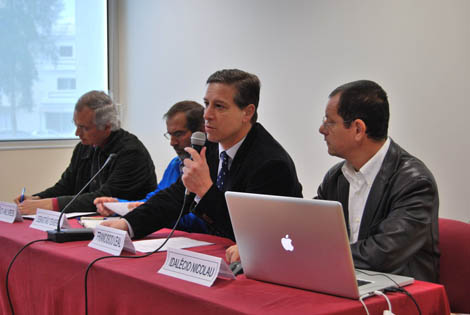 The municipality of Olhão hosted, on 16 and 17 November, the 3rd Regional Meeting of Environmental Volunteering for Water (ERVAA). Work began on Friday at the Secondary School of Olhão and ended on Saturday with several field trips, always focusing on the theme of Water and its rationalization.
The municipality of Olhão hosted, on 16 and 17 November, the 3rd Regional Meeting of Environmental Volunteering for Water (ERVAA). Work began on Friday at the Secondary School of Olhão and ended on Saturday with several field trips, always focusing on the theme of Water and its rationalization.
The Councilor for the Environment of Olhão, António Camacho, who opened the works on this day dedicated to water, referred to the importance of this essential asset to life, highlighting the component of environmental education, to which the Municipality of Olhão has been giving increasing importance, namely through Casa João Lúcio, “a space open to the community and where environmental awareness and education on this theme are effectively combined”.
This was one of the first events held at the new secondary school in Olhão, after major renovation works. “The school is new and serves the population,” said school director Idalécio Nicolau.
João Alves, director of the Southern Classified Areas Management department of the Institute for Nature and Forest Conservation (ICNF), and Sebastião Teixeira, director of the Coastal Water Resources department of the Portuguese Environment Agency (APA) – ARH Algarve, also were present at the opening session, referring to aspects related to the Water Law, the importance of species in the aquatic environments that exist in the region, such as the saramugo in the Guadiana Basin and, as João Alves insisted, even the Iberian lynx benefited from the water, as it was through a compensation program for the construction of the Odelouca Dam that the space where this species now breeds in Silves was born.
The link between youth, environmental volunteering and water has also been important, with more and more students from Algarve schools committed to this cause, as Sebastião Teixeira was keen to stress.
João Carlos Farinha, from ICNF, was one of the speakers who referred to the extreme importance of water on our planet, recalling that "only 0,4% of the existing water is available", said the expert, adding the great need for protection and rational management of wetlands. Ria Formosa was one of the first 12 sites classified in the RAMSAR network, which clearly shows its environmental importance.
At this meeting on volunteering for water, Maria Helena Alves and Maria Teresa Álvares, from APA – ARH do Tejo, spoke about the conservation and management of riverine ecosystems within the scope of the Water Framework Directive, referring to the necessary interventions so that the water lines are unimpeded, for example.
Francisco Keil do Amaral, from ICNF – Algarve, referred to good practices in relation to forest management and nature conservation. “Forest systems are important shelters for fauna or for feeding flora species”, said the forest engineer, recalling that the bonelli's eagle and the Iberian lynx are examples of fauna associated with forest areas in the Algarve.
Also in the fish community, vegetation is extremely important, both in terms of thermal energy, as well as the shade or stabilization of the banks. “If there is not good management of the hydrographic basin, there is a risk of not having good water in quantity and quality”, warned Francisco Keil do Amaral.
The panel moderated by Paulo Cruz, from the APA – ARH Algarve, also featured speeches by Marisa Viriato from Águas do Algarve, who spoke about the environmental program of the Odelouca Dam, and Helena Guimarães, from the League for Nature Protection , who spoke about the perspective of NGOs.
In the afternoon, the role of volunteering in the conservation of nature and biodiversity was mentioned with communications on the reintroduction of the osprey in Portugal, volunteering in the Vale do Guadiana Natural Park, the Ria Formosa Wildlife Recovery and Research Center and the Transboundary Environmental Volunteer Network.
In the last panel, the speakers focused more specifically on Environmental Volunteering for Water – Current and Future Perspectives and the audits of the voluntary monitoring campaign of the Algarve streams.
On the second day of the ERVAA, Saturday, field trips allowed for voluntary monitoring in the Ria Formosa – Quinta de Marim and Ribeira de Odeleite and had about three dozen participants. In the training “Aprender Doing” (theoretical-practical) on the monitoring of bioindicators from different ecosystems, given by specialists from the Center for Marine Sciences (CCMAR) of the University of Algarve, priority was given to training in benthic macroinvertebrates in the two field trips and in the laboratory work carried out at Casa João Lúcio/Ecoteca de Olhão.
There was also an opportunity to learn and volunteer at the RIAS – Wildlife Recovery and Research Center, in the middle of the Ria Formosa.


















Comments